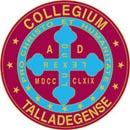
 As Alabama’s oldest private HBCU, Talladega College has a long and distinguished history as an undergraduate institution for African-American students. From its early days as a school for freed slaves to the creation of the Talladega College Historic District, TC has never wavered from its commitment to provide an education of distinction for black collegiates. With seventeen majors, extracurricular opportunities, and a successful NAIA II athletics program, Talladega College is a great choice for students who want a liberal arts education at a historically black college or university.
As Alabama’s oldest private HBCU, Talladega College has a long and distinguished history as an undergraduate institution for African-American students. From its early days as a school for freed slaves to the creation of the Talladega College Historic District, TC has never wavered from its commitment to provide an education of distinction for black collegiates. With seventeen majors, extracurricular opportunities, and a successful NAIA II athletics program, Talladega College is a great choice for students who want a liberal arts education at a historically black college or university.
Quick Facts
Location: 627 W Battle St, Talladega, Alabama 35160
Phone: (256) 761-6100
Website: www.talladega.edu
Type: 4-year, Public
Colors: Crimson and Blue
Motto: An Education of Distinction
Campus housing: Yes
Student population: 706 (all undergraduate)
Student-to-faculty ratio: 12:1
Student Life
- Greek Organizations: Yes
- Mascot: Tornadoes
- Athletic Association: NAIA II
- Athletic Programs: Basketball, Baseball, Soccer, Track and Field, Cross Country, Softball, and Volleyball
The Formation Of Talladega College
On November 20, 1865, Talladega College was created by a convention of freedmen. Three African-American leaders — William Savery, Thomas Tarrant, and Ambrose Headen— worked with General Wager Swayne of the Freedmen’s Bureau to open a school for the children of former slaves; under their care, the Swayne School building was purchased and filled with more than 100 students.
Talladega College In The 21st Century
Talladega College has grown over the last 150 years, and the original schoolhouse is now in the middle of a 50-acre campus. There are 17 primary buildings where students reside, socialize, and take classes during the school year; in addition to those structures, 32 buildings have been listed on the National Register of Historic Places as part of the Talladega College Historic District.
The city of Talladega is centrally located, and TC students are within driving distance of Birmingham, AL and Atlanta, GA. When class is not in session, students can participate in campus life or travel to other activities and events in the region.
Talladega College Academic Programs
As a private liberal arts institution, Talladega College offers 17 undergraduate majors: business administration, English, history, fine arts, music performance, mass media studies, biology, chemistry, computer science, mathematics, computer information sciences, psychology, social work, sociology, education, public administration, and criminal justice. In addition to their undergraduate programs, TC also offers an online master of computer information systems to graduate students who would like to earn a degree in information technology.
Talladega College Athletics &Extracurricular Activities
The TC athletics program is comprised of seven different sports teams: Talladega College basketball, baseball, soccer, track and field, cross country, softball, and volleyball. Most of their athletic events are held atSilsby Field; during the winter, the Talladega College basketball and volleyball teams play in theCallanan Gymnasium.
In support of the Talladega College athletics program, the Great Tornado (Talladega College band) and the Dega Diamonds (TC danceline) perform at home games, showcases, and national events. The Talladega College band is also the largest student organization on campus, followed by the school’s intramural sports teams.
Talladega College Notable Alumni
Talladega College’s notable alumni include:
- Margaret Bush Wilson was the first woman to Chair the National NAACP Board of Directors. Wilson graduated from Talladega College with honors, and earned her JD from the Lincoln University of Missouri School of Law in the mid-1940s.
- Rev. Dr. Paul Smith is an African-American religious leader and civil rights activist. He graduated from Talladega College in 1957, and went on to become the first African-American minster at the First Presbyterian Church of Brooklyn in New York.
- Jewel Plummer Cobb was a biologist, cancer researcher, and scholar. Cobb graduated from Talladega College in 1944, where she was a member of the Alpha Kappa Alpha sorority; she earned her Ph.D. from New York University in 1947, and built a distinguished career as a college professor.
Sources: Talladega College
